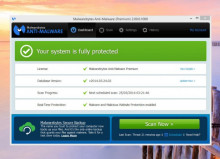Android ransomware demanding $300 from porn site visitors
Security researchers are warning about ransomware called Koler that demands $300 from Android users who bite on a fake app typically found on porn sites.
The phony BaDoink streaming app, which contains the Koler Trojan, is up on porn sites around the world, says Armando Orozco, senior malware intelligence analyst for Malwarebytes. The company gives credit to a researcher working under the name Kafeine for the discovery of the Android ransomware.













































































